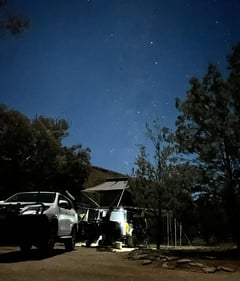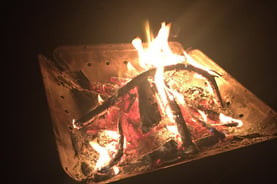Embracing the Great Outdoors: A Controversial Guide to Camping and Caravanning Etiquette?
We'll delve into essential camping etiquette to ensure that your outdoor adventure is not only memorable for you but contributes to a positive experience for all.


As camping gains popularity, the importance of being mindful of our fellow campers becomes even more crucial. Camping is not just about our personal experience; it's about creating a shared space where everyone can enjoy the great outdoors. We'll delve into essential camping etiquette to ensure that your outdoor adventure is not only memorable for you but contributes to a positive experience for all.
This post may be triggering for some, and some items may be controversial but I'm going to speak the truth about what goes on. We know that we are not the only ones who get annoyed when you pick the perfect spot to enjoy the quiet of nature and space of the great outdoors, and it is spoiled by not showing some common courtesies to fellow campers.
Here are some Effective ways to ensure a peaceful and enjoyable camping experience for everyone.
Choosing Your Campsite:
Arrival time:
Do not turn up at the campsites late at night. If you aren't going to get there at a reasonable time, stop on the way or leave early the next morning.
We have had people turn out at midnight and then proceed to open/close their car's doors constantly, talk loudly, use electric pumps to put up mattresses, and leave their car on all while doing this with the car fan going on and off. All of this while everyone else at the site was in bed trying to sleep!
Keep your distance:
Ensure there is ample space between your campsite and others to maintain privacy and reduce noise disturbance. If there are multiple spots available or just a big area, don't camp right on top of campers already there. If it is a small site or there is a little area between 2 other campers, and you have to squeeze in somewhere - DON'T! – People go camping to enjoy nature and not be on top of another person. There is a reason there is a little gap!
We had a huge area all to ourselves once and we were parked down the end with plenty of space for other people to camp further up, at 9.30 pm a group of 5 cars arrived and clearly had no idea what they were doing and instead of setting up camp further up they parked right next to us. I have also read a review of a campsite that they had to ask someone to move as they were camped so close they couldn’t open their door. Maybe that i a slight exaggeration in that review, but you get the picture.
On the other side, Don't spread yourself out too far.
On the opposite end of this scenario is campers spreading out more than they reasonably need. I think that is due to campers being burnt before with other campers setting up on top of them that they will extend their possession wide to avoid someone camping too close again
In Booking Only Camping Areas:
Pay the fee or do not stay there. If you don't have internet, drive to where there is and book a site. Do not turn up and just camp wherever you like. Someone may have already reserved these sites. If you do this, and the person who has spent the time to book/pay for a site arrives at the site, promptly move rather than telling them that whatever site is free because when the camper turns up to that site they will have to move.
Respect designated areas:
Camp only in designated camping zones to protect the environment and wildlife.
Noise Control:
Designated quiet hours:
Respect designated quiet hours to allow everyone a peaceful night's sleep.
Keep it down:
Whether it is music or conversations, keep volumes at a level that will not disturb neighbouring campers. Remember tents and even caravans are thin materials, so every sound is heard. Another reason why you should not camp right next to another camper.
Generator Usage:
If you need to use a generator to recharge your batteries, try to restrict its operation to the hours between 8 am and 6 pm. Limit usage to a maximum of a couple of hours to ensure fellow campers can enjoy the natural surroundings. Alternatively, consider investing in sufficient battery power and solar panels to meet your energy needs without relying on generators.
Unfortunately, generators are now being used increasingly in Australia. I do not understand why as there is plenty of solar options available and it adds extra weight and takes up space.
We have had two experiences with people using generators that have ruined our experiences in camping areas we have enjoyed before. One used a generator all night to play video games (in a tent) and have the fan on and another that didn't have any battery storage at all and was a long-term visitor so every night they would leave the generator on from dusk until they went to bed at 10.30, Sitting by the fire was not very peaceful or relaxing at night
Be more mindful of their impact on the environment when camping
Leave No Trace:
Pack it in, pack it out. Simple as that....
Dispose of all your trash responsibly, leaving the campsite as pristine as you found it.
Many campgrounds have been closed or are not viable to camp due to rubbish left by lazy inconsiderate people. It is not that hard to have plastic bags with you or specialised camping bags such as wheel bags for 4WDs or other sealable bags and throw it in the bin of the next town.
Note: toilet paper does not just disappear when left on the ground, it takes a while to decompose. Instead, it is blown around and stuck in the trees or all over the grass. Plus, it is disgusting!!
Even when camping with our motorbikes, we have a Sea to Summit garbage dry bag for our rubbish and tie it on the back of our bike.
Stay on designated paths:
Avoid trampling on vegetation and disturbing local ecosystems by sticking to established trails.
Don’t cut down trees for firewood. For starters, there is an environmental issue! Think carbon storage and could be an animals home, a shelter from predators, or food. The tree you have just cut down is still green and if it does burn it creates a think white smoke.
Campfire Courtesy:
Follow fire regulations:
Check local regulations and guidelines before starting a campfire. Ensure the coals are COMPLETELY extinquished before leaving. That includes pouring water or other liquid over the fire.
A few hours after arriving at a camping area in a State Forest, we noticed a thin trail of smoke about thirty metres away. It was a fire pit that had not been fully extinguished and was starting up again just from the wind slightly blowing. This could have been dangerous.
Glass bottles, cans and other metal:
Please do not throw or smash glass bottle and cans into the fire. Why people do this is beyond me. Most of the time it isn’t restricted to the fire and ends up being spread across the ground
Be mindful of smoke:
Position your campfire away from others.
Respecting Wildlife:
Observe from a distance:
Enjoy wildlife encounters without interfering by maintaining a safe distance.
Secure food:
Store food securely to prevent wildlife from becoming dependent on human sources, eat toxic products like plastic, or eat foods that are safe to us but may be poisonous to them.
We fell prey to this one when we forgot that we had left a closed tortilla bag on the table under other items to go to the bathroom (we packed everything else away). When we got back, we found a ringtail possum on the ground with the tortilla bag ripping it open. Luckily, we were able to grab the bag and then throw it in the bin. He loved our bin bag also and was trying to steal it, so we had to tie that to our bikes and put it away when we went to bed.
Bathroom Etiquette:
Use designated facilities:
Utilise established bathrooms when available; otherwise, follow Leave No Trace principles for waste disposal.
Close the Lid:
Practice good hygiene. Clean up after yourself and close the lid after using drop toilets.
Community Engagement:
Be neighbourly:
Greet fellow campers and be open to friendly interactions, but also respect their desire for privacy.
Share resources:
In communal areas, be considerate of shared spaces, such as cooking facilities and water sources.
Pet Etiquette:
Clean up after pets:
Ensure you clean up any waste your pets may produce. This rule can't be followed on suburban streets so not sure how it will be followed in the bush but think of it as if someone just decided to drop a number right where you are walking. Would you be disgusted? Yes well, it is the same for pet waste. Carry plastic bags with you and if you do it right you will not even be touching it. Yes, it is still gross but so is trying to pick it out of your shoe or walking barefoot in it.
Barking Dogs:
This should be under noise control, but I have included it here. Yes, dogs are going to bark occasionally cause that is what they do but constant barking is annoying to everyone around you. If your dog is going to bark at a leaf blown by the wind or the wind in general, then leave them at home or put them in a place they have nothing to bark at. And before you call me a dog hater, I love dogs and have always had dogs but barking dogs is one of the most annoying noises.
Leash your pets:
Keep pets on a leash to prevent them from disturbing wildlife or other campers.
What if you encounter others not following camping etiquette?
Unfortunately, there is not much you can do other than politely ask them to stop or move. Just be careful when doing this as we have encountered some people while camping that don't care how the things, they do impact other people. Also, we have encounter other camper that have possibly had mental health or social issues that we have not approached as we did not know what they would do.
The other options, although you should not need to do, is if it bothers you too much, to move to another area if possible and easy to do or when selecting a future campsite thinking through how you can avoid the same thing happening. This is sometimes hard as you really don't know when or who will turn up after you have set up camp.
Conclusion:
Camping offers a chance to enjoy nature and improve physical and mental well-being. It promotes relaxation, physical activity, provides a rejuvenating escape from modern life and a chance to connect with nature. Moreover, the exposure to natural light and outdoor settings can positively impact mood and sleep patterns.
Follow these simple camping etiquettes so everyone can enjoy the benefits of camping in the great outdoors.


